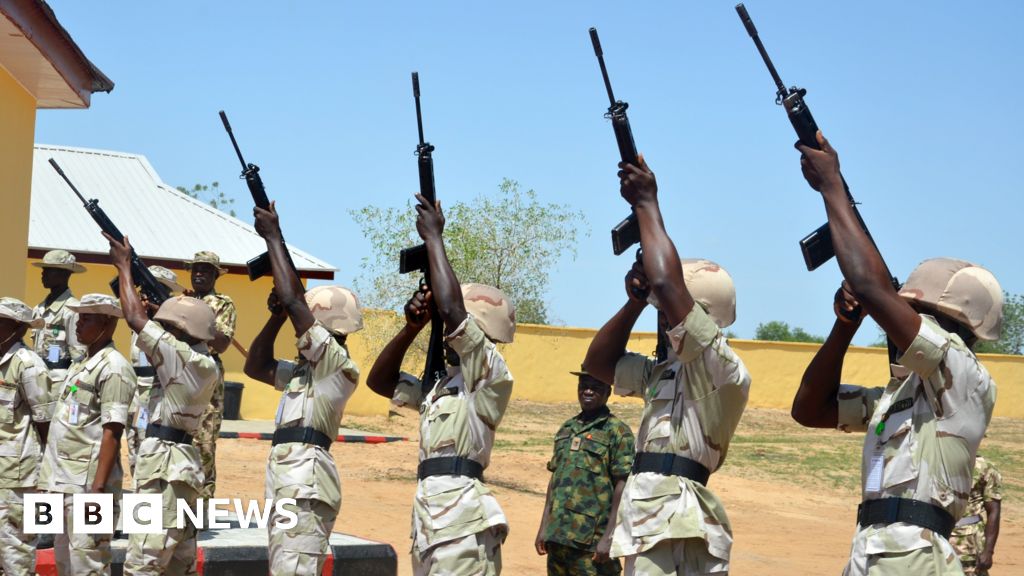More than 30 jihadists killed in air strikes, Nigerian military says

Nigerian Military Claims Dozens of Jihadists Killed in Airstrikes
Nigeria's military says it has killed 35 jihadists in a series of air strikes near the country's north-eastern border with Cameroon. The strikes, according to a statement released on Monday, targeted four areas in an effort to prevent attacks on ground troops. The operations come amid growing concerns about escalating violence across the West African nation.
Escalating Conflict and Civilian Concerns
For over a decade, Nigeria has been grappling with various security challenges, including jihadist insurgencies, violent criminal gangs, sectarian clashes, and widespread kidnappings for ransom. The north-eastern region, in particular, has been a hotbed of activity for groups like Boko Haram and the Islamic State West Africa Province (ISWAP).
The military's claims come just days after a group of prominent Nigerian figures, including former government ministers and civil society leaders, voiced deep concern over the escalating violence. In a statement released on Saturday, they highlighted what they described as "war-time levels of slaughter" occurring despite the country officially being at peace. The group cited an Amnesty International report from May, which stated that at least 10,217 people had been killed since President Bola Tinubu assumed office two years ago. They have called for the formation of a Presidential Task Force with broad powers to address the multifaceted conflicts.
Independent Verification Challenges
While the military reported killing nearly 600 militants in the region over the past eight months, independent verification of these claims remains a significant challenge. The remoteness of the conflict zones and restrictions on access for journalists and independent observers make it difficult to corroborate official accounts.
The Nigerian Air Force has stated its commitment to providing ongoing air support to ground troops engaged in dismantling jihadist bases in the north-east. However, the conflict's impact on the civilian population is undeniable. According to the United Nations, more than 35,000 people have been killed, and two million have been displaced by the violence.
Jihadist Tactics Evolving
According to the Institute for Security Studies (ISS), a think-tank focusing on African security issues, at least 15 jihadist attacks have been recorded this year alone in areas near Nigeria’s borders with Cameroon and Niger. The ISS has also noted a worrying trend: jihadist groups are increasingly employing modified commercial drones to target army bases, hindering the military's ability to deploy reinforcements.
Expert Analysis: Impact of Drone Warfare
"The use of drones by jihadist groups in the Lake Chad Basin represents a significant shift in tactics," says Dr. Fatima Akilu, a security analyst specializing in counter-terrorism strategies in West Africa. "These drones, while not as sophisticated as military-grade equipment, provide a relatively low-cost and effective means of reconnaissance and attack. They allow these groups to monitor troop movements, identify vulnerabilities, and disrupt military operations, ultimately prolonging the conflict and increasing the risk to both soldiers and civilians."
US Arms Sale Approved
Earlier this month, the United States State Department approved the sale of weapons worth $346 million to Nigeria. The sale is intended to bolster Nigeria's counter-terrorism efforts, but some human rights organizations have raised concerns about the potential for misuse of these weapons and the need for greater accountability and transparency in their deployment.
Historical Context: Boko Haram and the Rise of Jihadist Groups
The current conflict has its roots in the emergence of Boko Haram in the early 2000s. Initially focused on opposing Western education, the group gradually evolved into a violent insurgency seeking to establish an Islamic state in north-eastern Nigeria. The rise of ISWAP, a Boko Haram splinter group affiliated with the Islamic State, has further complicated the security landscape, introducing new tactics and expanding the geographical reach of the conflict. "The failure to address the underlying socio-economic grievances that fuel recruitment into these groups, combined with heavy-handed military responses, has only served to exacerbate the problem," says Dr. Akilu. "A comprehensive approach that combines military action with efforts to promote economic development, good governance, and social inclusion is essential to achieving lasting peace in the region."
Originally sourced from: BBC News Africa
